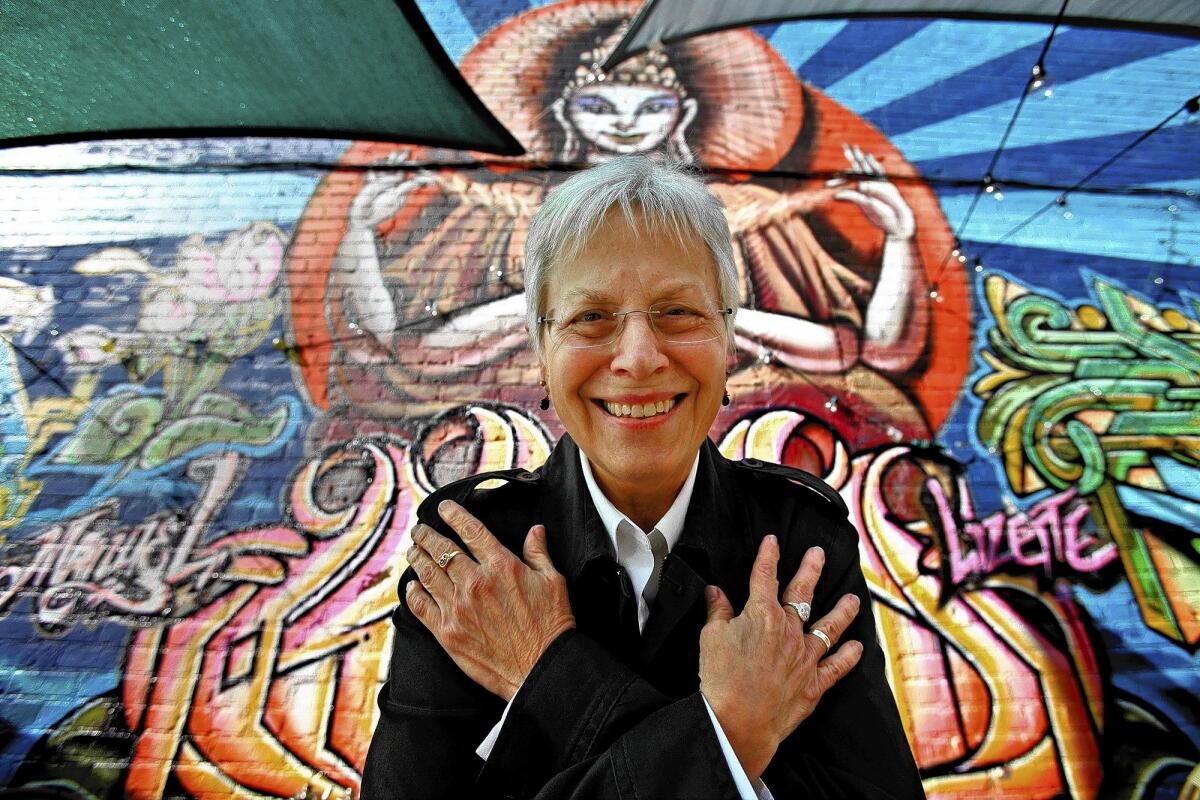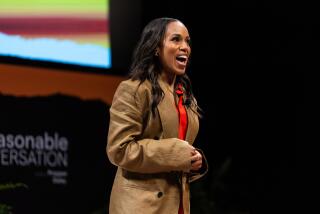Eloise Klein Healy finds poetry in her recovery from encephalitis

- Share via
If you listen closely to her, she still speaks like a poet — just not the poet she was before.
She sounds more like, say, Gertrude Stein, a free-associating poet who juggles and feints, making verbs serve as nouns and treating syntax like a jigsaw.
Eloise Klein Healy is Los Angeles’ first poet laureate. She was named to that post in December 2012, chosen by Mayor Antonio Villaraigosa.
She would not be an Emily Dickinson, shut up in her room and writing poems to hide in her bureau. She was to be a missionary, seeking converts and believers from Sylmar to San Pedro. And Healy was at the top of her game. Her book “A Wild Surmise” was collecting fine reviews for a poet whose constant inspiration was Los Angeles itself.
And then — there’s always an “and then” in literature — she got sick. In April, Healy appeared with Caroline Kennedy at a poetry event at the Los Angeles Central Library. A few who heard her said she seemed a bit off, like someone who was coming down with the flu.
It wasn’t the flu. It was encephalitis. At the kitchen table in their home in the Valley, Healy’s partner, Colleen Rooney, explained that the illness sent Healy from her writing desk to the ICU. Her electrolytes crashed. Her kidneys crashed. She spent three harrowing weeks on an anti-viral IV.
As a result of her illness, Healy resigned as poet laureate in September. It was a hard thing to do, but the duties required skills she could no longer command, at least for now.
She brought to the two-year laureate position both academic credentials and street cred. Texas-born and Iowa-bred, she came to L.A. as a child and found its quirky attractions to be the perfect subject for poetry.
In her seven books, like “A Wild Surmise” and “Artemis in Echo Park,” she surveys the life of Los Angeles, its vast, fast spaces and its myriad interiors. In “The Beach at Sunset,” she writes, “No matter what else is happening,/this is California. You’ll have your cancer/at freeway speeds. I’ll drive and park/and drive and park. The hospital/when I arrive to visit will be catching/the last rays of the sun, glinting/like an architectural miracle realized.”
Her influence has reached well beyond what they always call “slim volumes of poetry.” She headed the women’s studies program at Cal State Northridge, where she also taught, as she did at Immaculate Heart College, and at Venice’s influential Beyond Baroque writing center.
The poet laureate position was the job where all those lines converged, and she speaks of the post with affection: “I had an incredible time of me and cultural sweethearts. There are little parts I can’t do, they were real but they aren’t now, and I know them but I can’t say them.”
Healy is in intense therapy, which involves many things designed to treat the aphasia symptoms of her illness. There are vocabulary flashcards, dancing, listening to music (mostly the Beatles). Household objects are labeled with Post-Its: “oven” and “pantry.” The fact that Healy is left-handed, Rooney explained, somehow accelerates the relearning of speech.
The striking thing is how swiftly and confidently she still talks. When she can’t think of a word, she drops in a different one. And she breezily makes up words, saying her illness left her “all scrooped up.”
Kate Gale, managing editor of Red Hen Press, which publishes Healy’s work, explains it this way: “She understands what we’re talking about but her language feels very scissored, like whole sentences got scrunched up. It is very Gertrude Stein. Now, when I have conversations with her, the main way she has of expressing herself is as a poet. This is her core language.”
Gale visited Healy in the hospital and often since, and is “amazed at how much more conversational she is. I’m her editor but also her friend, and I want to assume that a year from now, she’s going to be much better, will be reading, and make sure she feels like she’s understood.”
Here is Healy talking about her roller coaster: “Since I had the real spookiness, I did have slips about normal things. Even sometimes with a certain proposal, I think I’m going to say something but I can’t, so I have to back up and call it something else. It was a different reality.”
Her mind still crafts and shapes phrases, as she realizes, but differently: “The way things are now, I’m in a little bit of what you might call a mess.... I have the parts that are complete, like all of us, but now I know there are parts of us that have thoughts, we can’t say them, like people standing outside a house and they can’t leave a message. I say something about things that do not speak to me as they used to. I’m an old poet — I can say silly things.”
According to Rooney, Healy has just begun to talk about returning to the world of poetry. “I’ve noticed she sees so much more — people, color. I see it like a poetic mind re-looking at the world.”
As for Healy, she tries to describe where she had gone and where she is working to be now. “I’ve had my road and I had a crash and I had to come back. Your regular road had its time and its phases, then I suddenly had this other part that engaged. It’s allowing me to take the belief that there is a world out there I can allow myself to be in.”
The mayor, Eric Garcetti, now adds to his to-do list the selection of a new poet laureate. “It was very sad to hear that Eloise can no longer continue as poet laureate,” he says. “She has wonderful poems [about] the geography of L.A. What made her a great poet laureate is that she was able to spread the power of writing and poetry in the most creative city on Earth.”
Now, he says, a new poet laureate will “continue to build on what Eloise has done, bring poetry to the people and capture L.A.’s history in this exciting moment.”
He is a fan of Healy’s poetry, and even her illness, he says, has its own poetic quality. “Poetry teaches us that behind every moment of happiness there may be sadness, and vice versa. I guess it’s somewhat comforting to me to know that someone who has such an articulate breadth of work can understand that this is the cycle of life.”
As the laureate process begins anew, Dana Gioia, former head of the National Endowment for the Arts and a professor at USC who played a part in Healy’s selection, suggests that the new laureate, like the last one, should be “a poet of artistic distinction who has deep roots in Los Angeles and would bring poetry and reading to the people of Los Angeles.”
Healy, he continues, “proved to be everything we had hoped for, and more. People loved her, and she loved them. She was everywhere, in splendid form.... ‘Tragedy’ is an overused word, but it’s an enormously sad situation that a poet as fine as Eloise, with this civic dedication, could not serve her full term.”
Healy was already well-known as founder of Antioch University’s MFA writing program and a mover and shaker at the Woman’s Building, but as laureate, says Gale, “it was like she’d stepped out from behind that shadow and was being recognized as Eloise the writer.” Before the illness, she had big plans to take poetry to schools and women’s shelters, prisons and train stations.
Now her goal is to reconnect with poetry and to reinvent her life, after the brainstorm jumble of illness. “I kept all of the parts!” she said gleefully. “I still could use more!”
More to Read
Sign up for our Book Club newsletter
Get the latest news, events and more from the Los Angeles Times Book Club, and help us get L.A. reading and talking.
You may occasionally receive promotional content from the Los Angeles Times.








